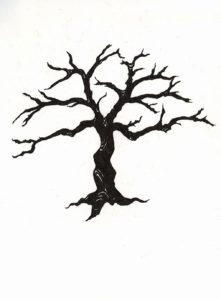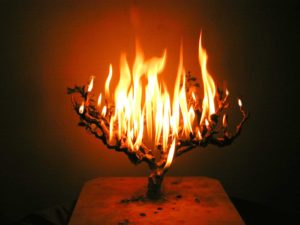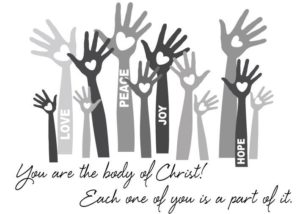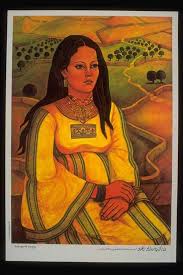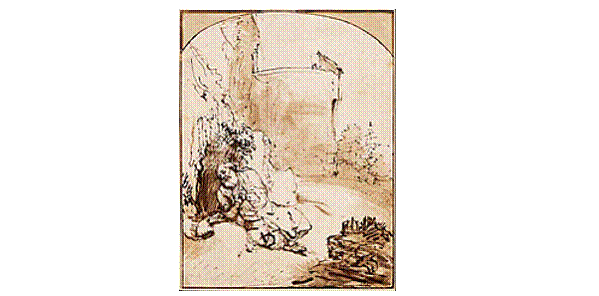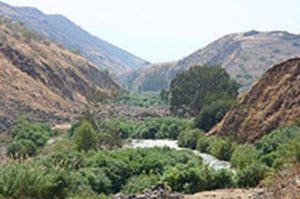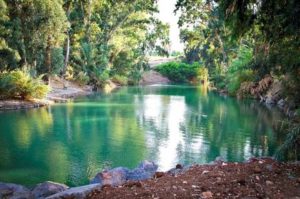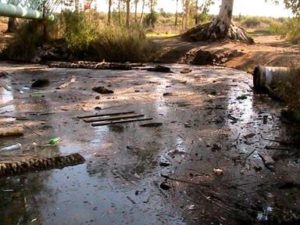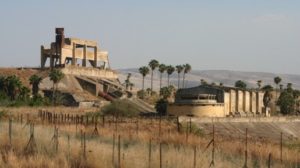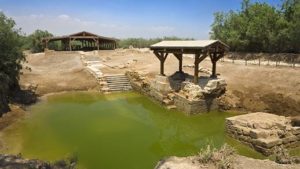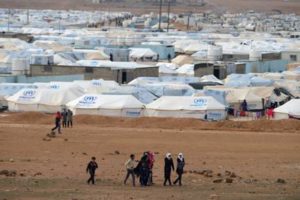Something’s wrong with this fig tree:
A land-owner came looking for fruit on his fig tree, but it was barren.
So he called the gardener and said, “This fig tree isn’t producing anything!
Cut it down!” But the gardener answered, “Let me dig around it
and put manure on it. If it doesn’t bear fruit next year, then you can cut it down.”
There was a prolific fig tree in Grandma Ross’s orchard. That fig was truly a tree – it was taller than the walnut trees around it, bending its branches down to the ground, where they rooted again and again, taking over a whole corner of the orchard.
Our boys loved that tree, hiding under its branches, and eating the figs. When they finally came out from under it, their faces were always smeared with fig juice.
If fig trees usually produce so many figs, what’s wrong with the fig tree in Jesus’ parable? After years of waiting, it’s still just a bush.
Maybe we can get a clue from Exodus, which tells us of another kind of bush.
The LORD appeared to Moses in a flame of fire out of a bush.
And Moses heard God calling him, saying:
I have seen the misery of my people…
Indeed, I know their sufferings,
and I have come to deliver them from the Egyptians,
and to bring them up out of that land to a good and broad land,
a land flowing with milk and honey.
But Moses knew he wasn’t a great speaker, and he didn’t think he’d make a good leader. So (partly as a delaying tactic) he asked for God’s Name:
Moses said to God,
“If I come to the Israelites and say to them,
‘The God of your ancestors has sent me to you,’
and they ask me, ‘What is his name?’ what shall I say to them?”
And God said to Moses,
I am who I am.
Go say this to the Israelites,
“I am has sent me to you. …
This is my name forever, for all generations.”
For several reasons, the ancient Hebrew text is difficult to translate, but the Hebrew letters have usually been translated into English as
I am who I am …. or …. I will be who I will be.
But there’s yet another way to understand this text, not just literally (knowing the letters), but spiritually (knowing what the text means).
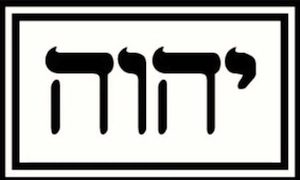 H <— V <— H <—Y
H <— V <— H <—Y
(Hebrew is read from right to left)
The Sacred Name
In modern times, we English-speakers have often pronounced God’s Name as YAHWEH. But throughout history, Jews considered God’s Name so sacred that it
could not be spoken. This Sacred Name was called the Tetragrammaton (which
simply means, 4 letters) – Y, H, V, H.
Wherever the Jews saw these four letters in the text, they would not pronounce them. Instead, they would substitute another word – Adonai (the Lord) or Elohim (God) or Elohim ‘ayyim (the living God).
And today, when you read Exodus in an English Bible (or in our bulletin this morning) you’ll see that the English translators have followed the ancient Jewish custom: instead of printing God’s Name, they have substituted L-O-R-D (always in capitals). Wherever you see L-O-R-D, the original Hebrew has Y, H, V, H.
Richard Rohr uses this passage from Exodus to teach the Yahweh Prayer: *
“Many are convinced that these four letters represent (and even imitate) the sound of breathing in and breathing out. If they are right, that means God’s Name was not spoken at all – it was breathed!
Y—H—V—H (pronounced Yood—Hay—Vov—Hay)
“In Hebrew and in many other languages, the word for “breath” also means “wind” and “spirit”. (In Chinese the word chi adds energy or life to the meaning – which helps us feel God’s creative energy, as well as Spirit, or breath.)
“Now if God’s Name is breathed (not spoken), this means that….
each and every moment of our lives, we are speaking the Name of God;
the Name of God is our first word as we enter this world;
the Name of God is our last word as we leave this world.
“And it also means that Y—H—V—H is ….
the same wind that hovered over the waters at the beginning of creation;
the same breath that God breathed into Adam’s nostrils to give him life;
same breath that Jesus breathed out upon the cross;
same breath that Jesus breathed on his disciples after his resurrection:
the breath of the Holy Spirit, the breath of peace, of shalom and forgiveness,
the breath of hope, and the breath of life.
“Notice that there is no American, African, or Asian way of breathing….
There is no Protestant or Catholic way of breathing.
There is no Jewish or Muslim way of breathing.
There is no rich or poor way of breathing.
That’s because the air of the earth is one and the same air,
and God’s divine breath, or wind, “blows where it will” –
which is everywhere.
* Adapted from The Naked Now: Learning to See as the Mystics See
To live fully, we humans need to learn how to breathe the breath of God, whose Spirit permeates us and everyone else on earth.
Indeed, the Spirit of God, the breath of God, fills the whole earth, and everything that lives upon it.
And now, back to Jesus’ fig tree
I don’t know who, or what, provoked Jesus to tell this parable.
Maybe it was the suffering of his people, crying out against their Roman occupiers; Maybe it was someone in the crowd, struggling to understand his teaching;
Maybe it was the religious leaders, stuck in their old ways of thinking.
But whoever it was, Jesus saw that their roots were stuck in hard, hard, ground.
Let the roots breathe, said the gardener to the landowner.
Everyone who’s ever kept a plant knows that they need to water it. But did you know that roots need air as much as water? It’s very common to see hard, compacted soil in people’s gardens or pots. Whenever the soil has no air left, roots struggle to breathe.
Roots, and people, need to breathe.
What was wrong with the fig tree?
Maybe the Spirit of God, the breath of God, the wind of God
needed to penetrate the hard soil packed around that fig tree’s roots,
so its roots could breathe again.
What do you find overwhelming these days?
The suffering of so many, many people – all around the world?
Your own health? The health of someone you love?
Our threatened environment? The next natural disaster?
Our country’s politics? Our world’s divisions?
God sends us, like Moses, to set his people free.
But most of us are just like Moses — we don’t think we’d make good leaders.
After all, we think, what can I do?
Whenever we are afraid of the future,
whenever we are afraid of a difficult assignment,
whenever we know we can’t possibly do it by ourselves,
let’s remember to let the Holy Spirit breathe through us.
Whenever I’m afraid, I try to remember the Yahweh prayer, and breathe it —
in and out, again and again, until my own roots are aerated,
until I remember again:
God is right here.
I try to remember to begin with the Yahweh prayer.
This prayer can free us to live fully in spite of our fears.
Preached at St. Patrick’s Episcopal Church, Kenwood, on March 24, 2019
* To watch Richard Rohr lead the Yahweh prayer, go to
https://www.youtube.com/watch?v=KNBKt87AWjA (Part 1)
https://www.youtube.com/watch?v=BCsh_R5-HuA (Part 2)

